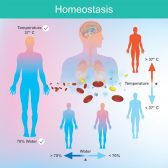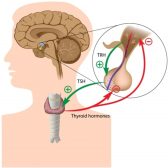Definition
noun, plural: glycoconjugates
A carbohydrate chemically linked to another compound, e.g. lipid or protein
Supplement
Glycoconjugates are essential in living things. They are carbohydrates that are covalently linked to another biomolecule via glycosylation and the carbohydrate constituent of the complex is called a glycan. Glycosylation is a process that forms glycoconjugates. In general, this biochemical process occurs in the cytoplasm of a cell. In eukaryotes, it occurs in the lumen of the endoplasmic reticulum (particularly, N-linked glycosylation) and in the cisterna of the Golgi apparatus (particularly, O-linked glycosylation). Glycosylation, particularly O-GlcNAc modification, occurs in the nucleus.
Glycoconjugates are involved in cell to cell communications, such as cell-cell recognition. They are also involved in cell to matrix interactions and in the process of detoxification. They are also essential in long term immune protection. Thus, glycoconjugate vaccines (e.g. immunization against influenza) are contrived to boost longer immune protection against carbohydrate antigens.
Examples of glycoconjugates are glycoproteins, glycopeptides, peptidoglycans, glycosides, glycolipids, and lipopolysaccharides. For instance, a glycolipid is a carbohydrate (e.g. certain oligosaccharides and polysaccharides) attached to a lipid is called a glycolipid. A glycoprotein is a carbohydrate attached to a protein.
See also:
- glycosylation
- glycoprotein
- glycolipid
- peptidoglycan
- glycoside
- lipopolysaccharide







